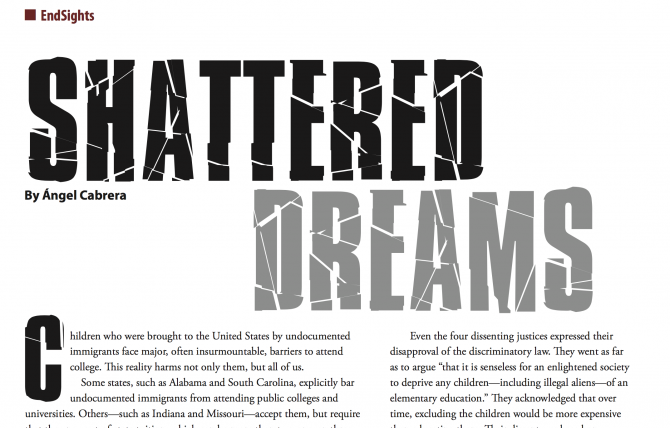Published in Public Purpose, The Magazine of the American Association of State Colleges and Universities, Summer 2017 edition. (Access pdf here)
Children who were brought to the United States by undocumented immigrants face major, often insurmountable, barriers to attend college. This reality harms not only them, but all of us.
Some states, such as Alabama and South Carolina, explicitly bar undocumented immigrants from attending public colleges and universities. Others—such as Indiana and Missouri—accept them, but require that they pay out-of-state tuition, which can be more than two or even three times what in-state students pay. In all states, undocumented students are denied access to Pell Grants or federal student loans, essential sources of financial aid for millions of people in the United States.
Despite the obstacles, or perhaps because of them, many of the undocumented students who manage to find a way to college become examples of resilience and determination. They engage in campus life, take on leadership roles, and use every opportunity to manifest their fierce belief in the American Dream, which they proudly use to define their shared identity—Dreamers.
In 2012, a federal program named Deferred Action for Childhood Arrivals (DACA) provided much-needed relief to thousands of Dreamers, including a work permit and respite from deportation. In some states, such as Virginia, DACA students are now eligible for in-state tuition. Yet, even in the best of circumstances, DACA students are still excluded from any form of federal financial aid.
The question of whether children of undocumented immigrants should be allowed to study is not new. In 1982, the U.S. Supreme Court heard a challenge to a Texas law that allowed school districts to deny enrollment to these children and withhold state funds for their education.
In the landmark Plyler v. Doe case, the Supreme Court ruled that the law was unjust because it denied students the equal protection of the laws guaranteed by the Fourteenth Amendment and because it penalized children for the actions of their parents. Also, by denying a young person the possibility to study, the justices argued, “we deny them the ability to live within the structure of our civic institutions, and foreclose any realistic possibility that they will contribute in even the smallest way to the progress of our Nation.” The justices also pointed out education’s role in serving society and how the policy relegates the a ected children to a lifelong economic disadvantage.
Even the four dissenting justices expressed their disapproval of the discriminatory law. They went as far as to argue “that it is senseless for an enlightened society to deprive any children—including illegal aliens—of an elementary education.” They acknowledged that over time, excluding the children would be more expensive than educating them. Their dissent was based on their assessment that this was a legislative, not a constitutional, matter.
Plyler v. Doe does not legally extend to higher education. But its arguments, and the language used
to support the decision, do apply, both morally and practically. The inherent injustice of making a young adult pay for other people’s actions, and the severe individual, societal and economic consequences of denying an education, apply to higher education just as they do to elementary and secondary education.
Questions surrounding immigration are complex and don’t lend themselves to easy solutions. However, when it comes to undocumented students who grew up in this country, the answer is clear: they deserve a chance to learn, grow and contribute to the progress of the nation many of them consider their own.

